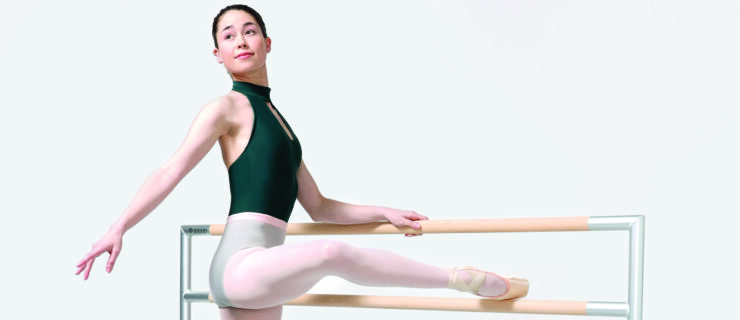Movin' On Up
Amanda Garcia started dancing at Prodigy Dance and Performing Arts Centre in Plano, TX, as an intermediate-level 12-year-old. But Prodigy’s owner and director, Camille Billelo, quickly recognized Garcia’s potential and placed her in classes with older students. For Garcia, being the youngest among advanced dancers was exciting—and a bit intimidating. She was determined to catch up. “I had to prove myself,” she recalls, “and that helped define me as a dancer.”
All dance students aspire to join a higher level. But once promoted, the tougher demands (both technically and physically) can be daunting. How can you convince your teachers, classmates and yourself that your new level is where you belong? The answer lies in your
attitude and work ethic both in and out of the studio.
Dancers at Adrenaline Nationals (photo by Spencer Dennis, courtesy Adrenaline)
Start Slowly
You were probably at the top of your former class, and the change from being the strongest to the greenest—or youngest—in your new one can be startling. Sometimes, it’s helpful to approach a new level one step at a time. Billelo transitions students by having them take only one or two higher-level classes per week (on top of their current classes) so they become familiar with their new teachers and classmates, as well as what’s expected of them, before moving up full-time.
One-on-one training can also speed up your progress. Billelo recommends that recently promoted students take a few private lessons with new teachers until they feel more comfortable. If it works with your schedule, ask if you can add a few lower-level classes, too, so you can work on the basics at a slower pace.
Show Your Commitment
As Garcia advanced through the ranks at Prodigy, she focused on building self-confidence, but found it crucial to stay open to criticism, advice and direction from her teachers. It showed she was committed to her training, and eager to stay in the higher level. “I look for passion and drive in a dancer—the students who, after class, ask ‘Do I have any more corrections?’ or ‘What can I do to improve?’ ” Billelo says. “I see which dancers come in early or stay after class to keep working. That’s how I know who really deserves to be in advanced classes.”
In class, show that you’re mature enough to handle the new and often more intense workload by immediately applying a correction, even if it wasn’t given to you directly. Pacific Northwest Ballet School principal Abbie Siegel cautions young dancers against going to class on autopilot. “A dancer may be taking class every day, but occasionally, it starts to become more of a habit for her just to be there,” she says. It’s not enough to just show up and go through the motions. Make the most out of each class, and write down your corrections each day.
And while it may be tempting to mingle with your new classmates and make new friends, do so after class. “It’s normal for students to become a close-knit group, because they spend so much time together,” says Miami City Ballet School faculty member Maribel Modrono. “But dancers need to let go of those attachments once they’re in the studio and redirect themselves to the teacher or choreographer.” It’s OK to turn to your fellow dancers every now and then for support, but don’t let your social network take away from your teacher’s corrections.
Stay Confident
Regaining confidence in a new level—and not giving anyone the chance to doubt your worthiness—takes bravery, commitment and self-assurance. When she first moved up to the senior level, Garcia struggled with self-doubt, but zeroed in on her own goals to tame her insecurity. “I went through a phase where I didn’t believe in myself,” she says. “I had to learn to put everyone else’s opinions aside. Once I stopped being intimidated by the other dancers, I really started to grow.” Now 19 and a dance major at Chapman University, Garcia mentors younger students at Prodigy, and encourages them to be ambitious and focused as they climb the dance ladder.
As the newbie, be a sponge for information from both the teacher and the older students—and don’t be afraid to reach out for help with anything unfamiliar. Try “shadowing” an accomplished student by doing the combination behind her (or in her group across the floor), attempting to match her lines or timing. Decorum and respect for seniority is important, but remember that this is now your class, too—you deserve to be there.
Feeling like you’re at the bottom is no reason to have low expectations. “If you’re in a competition level with a wide age range, don’t make excuses for yourself by thinking, ‘I’m not going to win anything this year because I’m the youngest,’ ” Billelo says. “Instead, set a goal, like making the top 10, and try to reach it.” But keep in mind that not reaching a goal doesn’t necessarily mean failure. “As long as you’ve worked hard,” Billelo continues, “you should feel good about yourself. Ultimately, it’s not about competitions and winning. It’s about your growth as an individual and as a dancer.”
Some days, you may feel more out of place than others. But Siegel stresses the importance of trust—in yourself and in your teachers. “We wouldn’t put you somewhere we didn’t think you belonged,” she says. “As teachers, our main goal is students’ success, and making them the best dancers they can be. Trust that we know what’s best for you.”
Telltale Signs You’re the Youngest—or Least Mature—in Your Level
Are you the new dancer in class? Avoid these five actions that betray your true newbie identity.
1.
Hiding in the back, the corner or behind other dancers. Having respect and an awareness of other dancers in class is important, but take some space for yourself, too. Getting up to speed will be a lot harder if the teacher can’t see you. Plus, excessive shyness telegraphs insecurity. Challenge yourself to go in front at least once per class until you feel brave enough to do it more often.
2.
Blowing off the combinations because you’re having trouble picking them up. They may be longer or more complex than you’re used to, but if you stop trying halfway through, you’ll never learn the steps. Block everything else out and concentrate. And remember: It’s OK to ask the teacher to repeat something.
3.
Never speaking up. While no teacher likes their class needlessly disrupted, if you have a question about a specific step or phrase, ask! Just make sure it hasn’t already been addressed (a sign you weren’t paying attention), and save questions that pertain to only you for after class. Your teachers want to know you’re working to improve.
4.
Forgetting the dress code. Let’s face it: Mistakes happen. But if you’re consistently forgetting your pointe shoes, jazz shoes, leotard or enough bobby pins to secure your hair, it’s a sign you’re careless. Take the responsibility of being in a higher level seriously.
5.
Trying to be exactly like another dancer. While you should certainly watch and learn from your more advanced classmates, don’t let your own self disappear. There’s a fine line between shadowing and copying. Take it from Chapman University dance major Amanda Garcia: “Dare to be different! You’ll stand out and grow as an artist.”



